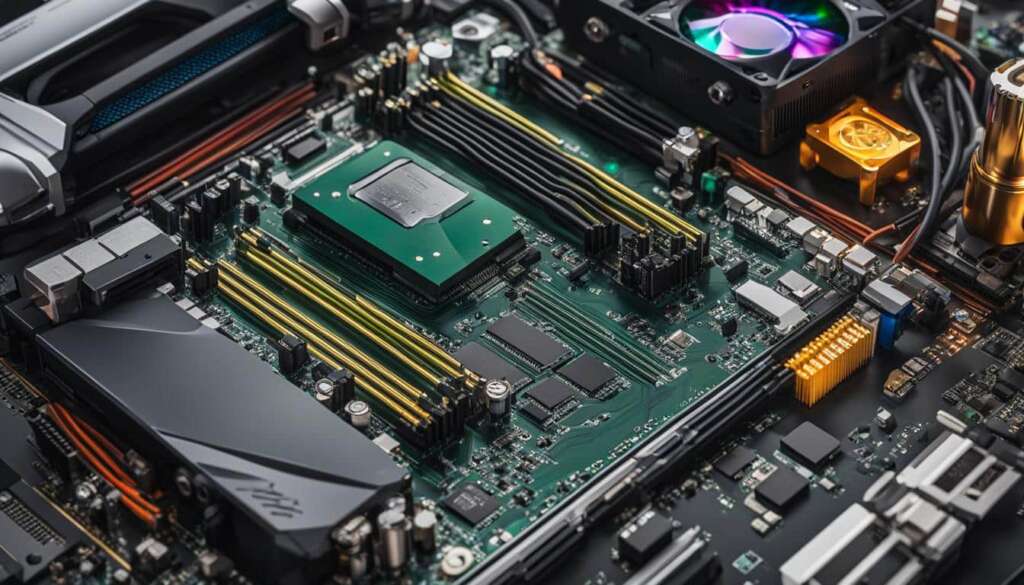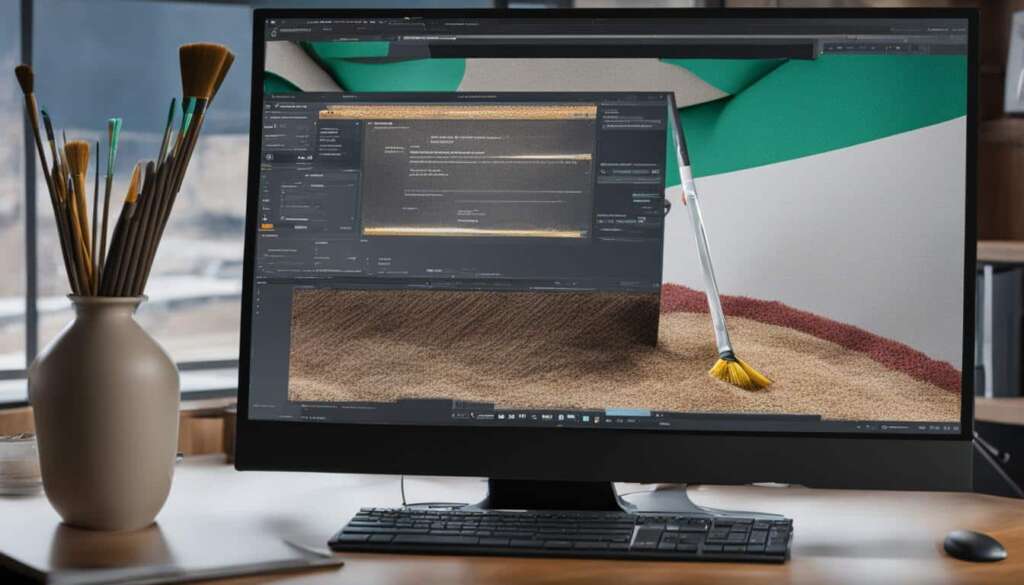Table of Contents
Are you looking to improve the efficiency of your PC and enhance its overall performance? Upgrading your PC is a cost-effective solution that can make a significant difference. By making a few essential PC upgrades, you can unlock your computer’s full potential and enjoy a smoother, faster, and more responsive experience.
One of the most accessible and affordable upgrades you can make is to increase your RAM. RAM, or random-access memory, plays a crucial role in multitasking and handling resource-intensive tasks such as video editing or gaming. Upgrading from 4GB to 8GB or even 16GB of RAM can provide a noticeable improvement in speed and responsiveness, allowing for seamless multitasking and smoother performance in demanding applications.
But why stop at RAM? Upgrading your graphics card can take your PC’s performance to the next level, especially if you’re a gamer or work with graphic-intensive applications. A dedicated graphics card, such as the powerful GeForce RTX 3070, can significantly enhance your gaming experience, delivering smoother gameplay, higher resolutions, and better visual quality.
Another critical upgrade to consider is your storage drive. Swapping out your old hard disk drive (HDD) for a solid-state drive (SSD) can dramatically improve system responsiveness and reduce loading times. SSDs use flash memory, resulting in faster data access and quicker application loading. With an SSD, you can enjoy faster boot times and improved performance in tasks requiring large file access, such as video editing or RAW photo editing.
Lastly, don’t overlook the importance of your processor. While upgrading your processor is a more advanced and expensive task, it can provide a significant performance boost. Moving from an Intel Core i3 to a Core i5 or upgrading to a newer generation processor can improve system speed and efficiency. However, it’s essential to consider compatibility with your motherboard and potential BIOS updates, as well as the potential need to upgrade other components like RAM and the motherboard itself.
Embrace the power of these essential PC upgrades, and you’ll witness a remarkable transformation in your system’s speed, responsiveness, and overall performance. Whether you’re a gamer, a content creator, or simply looking to optimize your daily computing tasks, upgrading your PC is a surefire way to unlock its full potential and ensure optimal performance.
Upgrading RAM
Increasing the amount of RAM in a PC can provide a significant performance boost, allowing for smoother multitasking and improved efficiency in resource-intensive tasks such as video editing and gaming. While 8GB of RAM is typically sufficient for general use and light tasks, upgrading to 16GB or even 32GB of RAM can enhance performance and prevent system slowdowns when engaging in demanding activities that require more memory.
Upgrading RAM allows your computer to handle multiple tasks simultaneously without experiencing a lag in performance. It enables seamless multitasking, allowing you to work on multiple applications, tabs, or documents without any noticeable slowdown or loss of responsiveness. Whether you’re a content creator working on multimedia projects or a gamer running the latest graphically intense games, a RAM upgrade can provide the necessary power to ensure a smooth experience.
By upgrading your RAM, you give your system the capability to store and access more data quickly. This additional RAM capacity improves the overall performance of your PC, especially when running applications that require a large amount of memory, such as video editing software or virtual machines.
Choosing the Right RAM Upgrade
When considering a RAM upgrade, it’s important to determine the specific requirements of the tasks you frequently perform on your PC. For general use and light tasks, an upgrade from 4GB to 8GB of RAM can provide a noticeable improvement in speed and responsiveness. However, if you regularly engage in multitasking, gaming, video editing, or other resource-intensive activities, upgrading to 16GB or even 32GB of RAM is recommended for optimal performance.
It’s worth noting that not all systems are capable of accepting higher amounts of RAM. Before upgrading, ensure that your computer’s motherboard supports the desired RAM capacity. Additionally, consider the maximum amount of RAM your operating system can utilize. For example, a 32-bit operating system can only support up to 4GB of RAM, so upgrading beyond that limit would offer no performance benefit.
Overall, upgrading your RAM is a cost-effective and accessible way to boost your PC’s performance. Whether you’re a casual user looking for smoother multitasking or a power user requiring optimal performance for resource-intensive tasks, a RAM upgrade can provide the necessary performance boost to enhance your computing experience.
Upgrading Graphics Card
A dedicated graphics card is a crucial upgrade for enhancing gaming performance and handling graphic-intensive applications. While integrated graphics may be sufficient for basic tasks, they lack the power required for demanding games or professional work. Upgrading to a dedicated graphics card can significantly enhance graphics performance, leading to smoother gameplay, higher resolutions, and better visual quality.
One highly recommended graphics card for gaming enthusiasts is the GeForce RTX 3070. The GeForce RTX 3070 offers impressive performance capabilities and is built with the latest technologies, including real-time ray tracing and AI-enhanced graphics. This powerful graphics card ensures smooth and immersive gaming experiences, even in visually stunning and resource-demanding games.
When choosing a graphics card upgrade, it’s essential to consider compatibility with your system’s power supply, motherboard, and available expansion slots. Doing your research and ensuring compatibility will help avoid any potential issues and ensure a seamless upgrade process.
“Upgrading to a dedicated graphics card can take your gaming experience to the next level, allowing you to enjoy visually stunning games with higher frame rates and improved overall performance.”
Key Benefits of Upgrading Graphics Card:
- Superior gaming performance with smoother gameplay
- Support for higher resolutions and better visual quality
- Real-time ray tracing for realistic lighting and reflections
- AI-enhanced graphics for more immersive gaming experiences
- Compatibility with the latest games and future-proofing your system
| Graphics Card | Performance Rating | Price |
|---|---|---|
| GeForce RTX 3070 | 9.5/10 | £499 |
| GeForce RTX 3060 Ti | 9/10 | £369 |
| GeForce RTX 2080 Ti | 8.5/10 | £1,199 |
By upgrading your graphics card, you can unleash the full potential of your gaming rig and enjoy a more immersive and visually impressive gaming experience. Whether you’re an avid gamer or a professional working with graphic-intensive applications, a dedicated graphics card is an investment that will greatly enhance your PC’s performance and ensure a smooth gaming experience.
Upgrading Storage Drive
When it comes to improving overall system performance, upgrading the storage drive is often an overlooked yet highly effective solution. By replacing an old hard disk drive (HDD) with a solid-state drive (SSD), you can experience significant improvements in system responsiveness and reduced loading times.
Unlike traditional HDDs that rely on spinning disks to read and write data, SSDs use flash memory technology. This allows for much faster data access, resulting in faster boot times and quicker application loading. The benefits of upgrading to an SSD extend beyond everyday tasks, making it particularly advantageous for activities that involve accessing large files, such as video editing or RAW photo editing.
With an SSD, you can expect:
- Faster boot times: No more waiting around for your computer to start up. An SSD can drastically reduce boot times, allowing you to get to work or play faster.
- Quicker application loading: Applications will launch almost instantly, saving you valuable time and improving productivity.
- Improved performance for resource-intensive tasks: Whether you’re editing videos or working with large data sets, an SSD can handle these tasks more efficiently, resulting in a smoother and more responsive experience.
Upgrading your storage drive is a relatively straightforward process that can have a significant impact on overall system performance. With faster boot times, quicker application loading, and improved performance in resource-intensive tasks, an SSD upgrade is a worthwhile investment for any PC user.
Don’t settle for sluggish performance. Upgrade your storage drive to a solid-state drive and experience the benefits of faster boot times and improved system responsiveness. Whether you’re a professional seeking better productivity or a casual user looking for a smoother computing experience, an SSD upgrade can make a world of difference.
Upgrading Processor
Upgrading the processor is a more advanced and costly task compared to other PC upgrades, but it can provide a significant performance improvement. When considering a processor upgrade, it is essential to assess whether there will be a noticeable boost in performance, such as moving from an Intel Core i3 to a Core i5 or upgrading from an older generation to a newer one.
However, compatibility is a crucial factor to consider before proceeding with a processor upgrade. Ensure that the new processor is compatible with your current motherboard. In some cases, upgrading the processor may require BIOS updates or even the replacement of other components like the motherboard and RAM.
Before venturing into a processor upgrade, it is recommended to research and consult the documentation of your current system to determine compatibility and potential upgrade limitations. Consulting with a computer technician or seeking professional advice can be beneficial in making an informed decision.
FAQ
Why should I upgrade my RAM?
Upgrading your RAM can boost PC performance by allowing for smooth multitasking and improved performance in resource-intensive tasks like video editing and gaming. Increasing your RAM from 4GB to 8GB or even 16GB can provide a noticeable improvement in speed and responsiveness.
How much RAM do I need for optimal performance?
For general use and light tasks, 8GB of RAM is typically sufficient. However, for multitasking, gaming, video editing, and other resource-intensive tasks, upgrading to 16GB or even 32GB of RAM can enhance performance and prevent system slowdowns. Understanding the specific requirements of the tasks being performed will help determine the ideal RAM upgrade.
Is a dedicated graphics card necessary?
Yes, a dedicated graphics card is essential for improved gaming performance and handling graphic-intensive applications. While integrated graphics may be sufficient for basic tasks, they lack the power needed for demanding games or professional work. Upgrading to a dedicated graphics card, such as the GeForce RTX 3070, can significantly enhance graphics performance, allowing for smoother gameplay, higher resolutions, and better visual quality.
How does upgrading to a solid-state drive (SSD) improve system performance?
By replacing an old hard disk drive (HDD) with an SSD, you can significantly improve system responsiveness and reduce loading times. SSDs use flash memory instead of spinning disks, resulting in much faster data access. This upgrade can lead to faster boot times, quicker application loading, and improved performance in tasks that require accessing large files, such as video editing or RAW photo editing.
Is upgrading the processor necessary?
Upgrading the processor can provide a performance boost, but it is a more advanced and expensive task compared to other upgrades. This upgrade should be considered when there is a significant improvement in performance, such as moving from an Intel Core i3 to a Core i5 or from an older generation to a newer one. However, compatibility with the motherboard and potential BIOS updates should be taken into account. Upgrading the processor may also require upgrading other components such as the motherboard and RAM.







